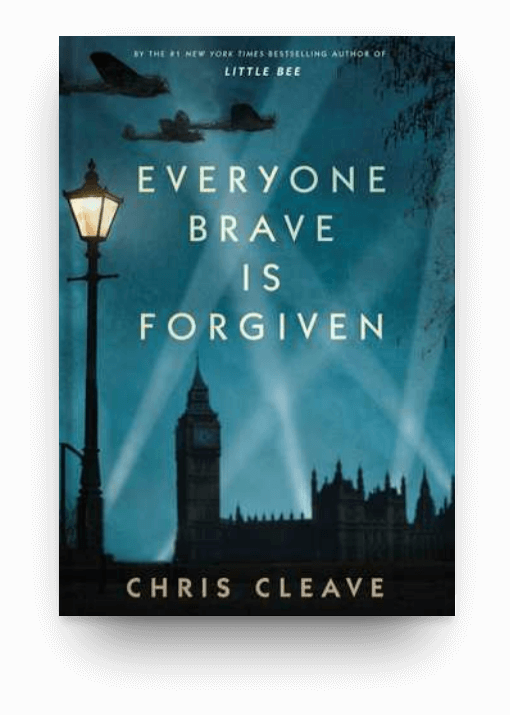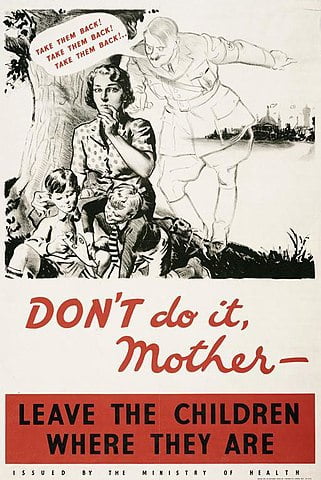The Story of the Story: Everyone Brave Is Forgiven
This post may include affiliate links. That means if you click and make a purchase, I may earn a small commission. Please see Disclosures for more information.
I’ve been hearing about Chris Cleave’s Everyone Brave Is Forgiven for a while now, and after reading his Little Bee last year (one of my top 12 reads of 2017), I knew I had to read it. As a historical fiction novel set during World War II, it also seemed like a great book to kick off my Story of the Story series. (Note: I’ve tried to avoid spoiling the major elements of the story, but there may be some minor spoilers below.)

The Book (and Mini-Review)
Everyone Brave Is Forgiven
An hour after England enters World War II, socialite Mary North signed up for service. Instead of direct involvement in the war, she finds herself teaching students who were rejected from the countryside after most other children were evacuated from London. This turn brings into her life Zachary, a young black student; Tom, an education administrator; and Alistair, Tom's flatmate who has enlisted in the military. Mary, Tom, and Zachary face a new normal in London as the bombings of the Blitz commence, while the ills of society--race, poverty, addiction--persistently remain the same. Alistair, meanwhile, faces the brutality, starvation, and violence of life as a soldier in Malta.
Cleave's prose can feel heavy-handed, especially at first, but I soon fell under the spell of his writing. His dialogue shines and is smart and surprisingly funny. In its wittiness, it recalls the type of conversations that seem to happen in youth, especially during late nights or intense situations--the intelligent volleying that immediately connects people. Cleave uses these conversations masterfully to create instant connections between characters facing extreme circumstances. Inspired by his own grandparents' experiences and letters written during World War II, Cleave tells a beautiful tale of love, loss, and bravery. Also check out my in-depth look at the history and writing of this book, the first in my Story of the Story series.
More info →The Author
Chris Cleave is quickly becoming a must-read author for me after Little Bee and Everyone Brave Is Forgiven. He has a unique, smart way of bringing humor into his writing about serious topics, in a way that manages to draw both chuckles and horror at the sharp, grim observations inside of the quips.
Chris Cleave’s author website is a treasure trove of background information on this book. Go check it out if you want the full story straight from him. He also has a nice collection of videos discussing the book–I embedded the one on dialogue below, but I also really like the one discussing the character of Mary.
(And if you have a book club reading Everyone Brave Is Forgiven, he extends the offer to visit with your club via Skype!)
The Writing Process
- Chris Cleave was inspired by the experiences of his grandparents, as well as the letters they wrote during that time, though the book is not meant to tell their stories.
- Cleave has been called a “method author.” Like method actors, he immerses himself in the actual circumstances of the story he’s writing.
- While writing Everyone Brave is Forgiven, Cleave traveled to Malta and slept only in the places where his grandfather slept.
- For three months, he also lived on the rations that would have been available in London during WWII, including lard, margarine, sugar, and tea. He lost 22 pounds.
- Cleave read the novels his characters would have read, listened to the music and radio shows of the time, and visited the places they would have gone.
- As most writers do, Cleave had an overall arc and plan for his characters—but in the way of war, some of them died earlier than planned.
“I had particular points in mind where the characters died. Then I went back and just arbitrarily killed them 25 pages earlier. It was brutal. I gave myself huge problems because they had died at very inconvenient moments. But that’s war—horrible, brutal, arbitrary. Death comes unexpectedly. I just cut them off midsentence. It was a real nightmare to fix the book.” – From Chris Cleave: Relationships tested while world at war – interview in BookPage
That Dialogue
The sharp back-and-forth, humorous dialogue was a notable and surprising feature of this book set in the bleakest of conditions. One small example (this is Mary and Hilda, though really the exchanges between Alistair and Simonson were some of my favorites):
“That’s the difference between us. I want a better world, you want better hair.”
“Hardly as an end in itself. I want the hairdo so I can get a man in uniform.”
May sighed and picked up the comb again. Hilda smiled at her in the mirror, and Mary returned the favor. “Your face is not entirely dreadful to behold, you know,” she said, angling Hilda’s head. “You might almost pull off this look, in conditions of very low light.”
“Sadly, your flaws as a friend would be visible in pitch dark.”
“You are indolent and asinine,” said Mary.
“You are obstinate and self-satisfied,” said Hilda.
-Everyone Brave Is Forgiven
While this humor may be a hallmark of his writing (it appeared in Little Bee as well, though more in the prose than the dialogue), for Everyone Brave Is Forgiven, there was a purpose and an inspiration for the humor.
“I hoped to isolate the wartime generation’s spirit and bottle it as an antidote. I didn’t find it where I first began looking: in stoicism and heroic deeds. I found much evidence of both, of course, it was this generation’s underlying psychology that was to have real impact.
As he explored this idea, he was inspired by the communication style of his grandparents.
“I remembered how my grandparents used to talk. Before TV and social media, before the age of glib polemic and modish indignation, conversation was the entertainment. They became expert in teeing up lines for each other to hit. Their dialogue was such raging fun that it brought people together. A nation talked itself into bravery and out of self absorption. It was when exchanging the deepest of letters and the shallowest of quips that people were really winning the war.”
I love this piece by Cleave in The Telegraph that details his thoughts on the dialogue in his story, and of the time: To Write My New Wartime Romance, I Had to Live Like My Grandparents.
Cleave also discusses the bravery of continuing this kind of conversation in this video:
The History
Cleave brought to light a few aspects of World War II that were unfamiliar to me.
The Evacuation of Children from London
While I was familiar with the Blitz, I didn’t know that many children were evacuated from London prior to the start of the bombings.
- Operation Pied Piper was set up to spare children from the experience and danger of bombings. In Everyone Brave Is Forgiven, we saw children who were relocated to rural areas of Britain where there were unlikely to be attacks.
- Kids, mothers with infants, and “the infirm” were also shipped to Canada, South Africa, Australia, New Zealand, and the United States.
- In total, 3.5 million people were evacuated.
- Evacuation was voluntary, and many parents brought their children back to London when the expected bombings hadn’t yet happened by the end of 1939–despite warnings not to.

By Ministry of Health (publisher/sponsor), J Weiner Limited, London (printer), Her Majesty’s Stationery Office (publisher/sponsor) – This is photograph Art. IWM PST 3095 from the collections of the Imperial War Museums. Public Domain. - The evacuations were fast and furious, and families in these rural areas often selected children from a line up to take home with them—with apparently very little vetting. (Can you imagine that happening today??)
- Evacuation wasn’t easy. Between the separation from their parents, the uncertainty of what was happening at home, and moving into the homes of unknown (and unvetted) people, subsequent studies found the evacuations just as or more traumatizing than the bombings.

In his research, Cleave noticed that evacuated children in photos were almost all white, while photos of children remaining in London included more black and mixed-race children. This observation prompted him to explore the racism that persisted even in wartime.
Racism
Racism isn’t something we hear a lot about in the context of the cities cities under siege during World War II, unless it was coming from the Nazis themselves. But Cleave brings it to light through Zachary, the young black student rejected from the countryside where evacuated children were taken, and the community of black people who worked in minstrel shows.
Part of Cleave’s goal was not just to focus on the solidarity that comes with fighting the common enemy, but also the societal tensions that remained in spite of that common battle.
“For me, the story lies in those tensions. I think there are two wars we have to win. One of them is against the enemy, yes, but the other one is against the tendency of our own society to divide, to polarize, to fracture.”From Chris Cleave: Relationships tested while world at war – interview in BookPage
Malta
Cleave sets part of the book’s action on the island of Malta, where the character Alistair is stationed during the intense Siege of Malta.

During the siege, German and Italian forces relentlessly bombed the island with more than 3,300 raids over a period of two years. During this time, more than 1,500 civilians and 7,500 soldiers died.
For those who knew as little about Malta as I did, here is a bit of background:
- Malta was a British colony during World War II, with a population of about 270,000 at the time.
- Its location in the Mediterranean was strategic for the British to sustain the war in North Africa and eventually launch attacks in Italy.
- As we saw in the book, the bombing nearly brought Malta to its knees, and civilians and military alike suffered food and water shortages.
- Supplies eventually arrived, and the Allies launched their invasion of Sicily from Malta.
Read more, and see photos from Malta during World War II.
The Wrap-Up
I learned so much while looking into the backstory of Everyone Brave Is Forgiven. I have a new respect for Chris Cleave and his careful thought, research, and writing. He tells a great story, and I also enjoyed reading his interviews and watching his videos
All sources that I used to put this article together are linked above.
Now I want to hear from you!
- Did this article enhance your understanding or appreciation of Everyone Brave Is Forgiven?
- What questions remain for you? (For me, I want to know more about the minstrel community in WWII London–I found very little information!)
- Is there anything else you’d like to see explored in articles like this? More on the characters or specific story decisions, perhaps?




